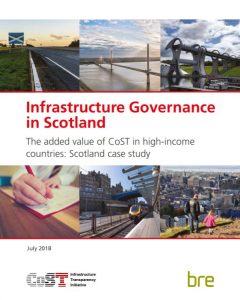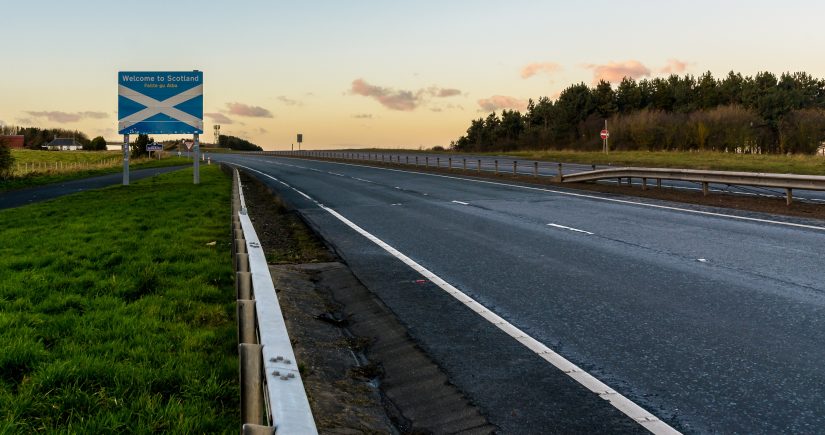CoST releases its second publication in its series exploring the need for infrastructure transparency in high-income countries and the added value of CoST to these contexts. Published in partnership with BRE, our latest publication, Infrastructure Governance in Scotland examines how Scotland’s institutional innovations are embracing transparency, engaging citizens and promoting accountability.
 We find that Scotland has taken significant steps towards advancing infrastructure transparency particularly through its institutionalisation in law and policy. Such steps have been marked by the establishment of its Public Procurement Reform Board, the Scottish Freedom of Information Act (2002) and its membership to the Open Government Partnership (OGP). However, we find there is still room for improvement and by addressing areas relating to all four core features of CoST, disclosure, assurance, multi-stakeholder working and social accountability it could significantly advance its infrastructure transparency profile.
We find that Scotland has taken significant steps towards advancing infrastructure transparency particularly through its institutionalisation in law and policy. Such steps have been marked by the establishment of its Public Procurement Reform Board, the Scottish Freedom of Information Act (2002) and its membership to the Open Government Partnership (OGP). However, we find there is still room for improvement and by addressing areas relating to all four core features of CoST, disclosure, assurance, multi-stakeholder working and social accountability it could significantly advance its infrastructure transparency profile.
The Scottish Government reports on its progress on major infrastructure projects on a six-month basis. As a result, the data disclosed on projects over £20 million is high by both UK and international standards. When assessed against the CoST Infrastructure Data Standard (CoST IDS) which requires 40 data points (or items) to be disclosed at various stages of an infrastructure project cycle, we found that 95% of the data points on these large projects was disclosed.
Scotland’s disclosure efforts in this regard must be commended, however, transparency is much lower for projects below £20 million. Thus, our recommendations focus on ensuring the current disclosure practice be extended to those of a lower threshold, alongside reaching the 100% disclosure obligation of the CoST IDS for both proactive and reactive disclosure. If Scotland were to publish data on an online platform this would also make access to information easier. The CoST experience of using such platforms in Honduras and Malawi has proved highly successful.
In terms of citizenship engagement, we found that the Government is committed to giving a voice to citizens and others, but efforts have been limited to keeping people informed rather than actively involving them to influence decisions. Participation is also dependent on the commissioning body, sometimes this results in very participatory processes, but one which is not systematic. If Scotland were to adopt principles of multi-stakeholder working this could go a long way to building trust and buy-in. For example, its Infrastructure Investment Board, drawn exclusively from Government and public bodies, could include civil society and the private sector.
Scotland has effective accountability measures in place to validate and interpret disclosed infrastructure data, including through Audit Scotland and the Public Audit and Post-Legislative Scrutiny Committee – two highly regarded channels. Public inquiries are carried out and have reported on the Scottish Parliament Building and are being conducted on the Edinburgh tram. Despite these positive steps, a process of regular, independent review of data is needed. The CoST experience shows that independent validation provides assurance to the media, civil society and citizens that public infrastructure projects are managed and on track. It provides a cost-effective way to provide increased accountability on an ongoing basis.
Sub-national governments such as Scotland are playing an increasingly important role in the planning and delivery of public infrastructure. This study provides an opportunity for CoST to both contribute to and learn from such administrations.
This September Scotland will publish its second OGP action plan, providing a major opportunity for the Government to specify its commitments to infrastructure planning and delivery and to incorporate CoST’s core features into current practice. Furthermore, if Scotland were to join CoST, it could showcase its journey on an international stage and provide a significant opportunity for lesson learning and sharing between Scotland and CoST members.
